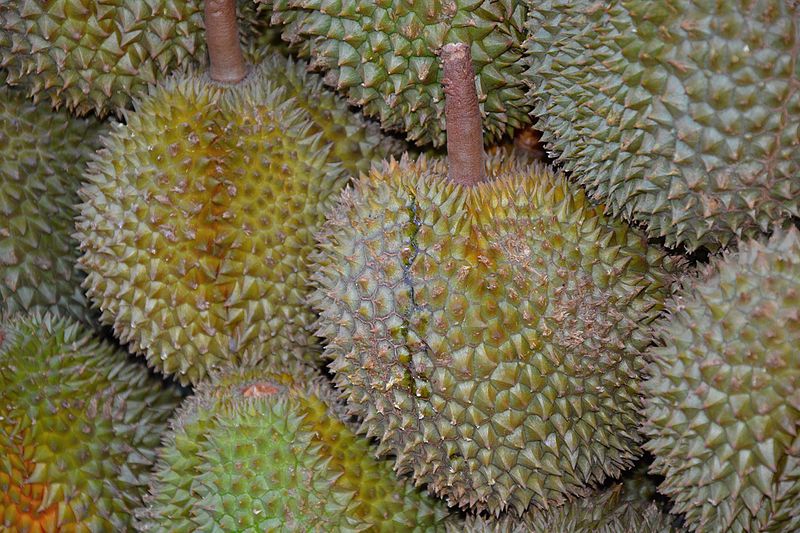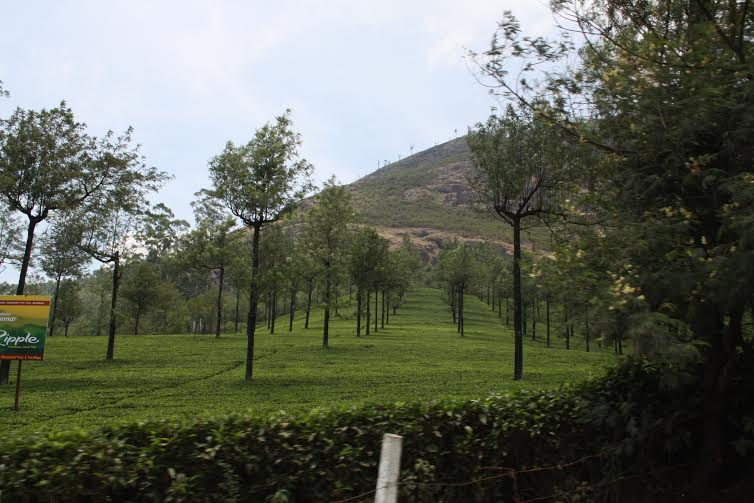Health Benefits of Durian
Health Benefits of Durian fruit - Durian is an exotic fruit with several health benefits. Its Botanical name is Durio zibethinus. It is spiky fruit with a strong odour. Though it is spiky it is not related to jackfruit or breadfruit. Depending on the species, Durians can be round or oblong, its husk green to brown, and its flesh pale yellow to red.
According to “The Illustrated Encyclopedia of Trees and Shrubs,” durians are an ancient fruit, enjoyed in Southeast Asia since prehistoric days. Today it is available in Burma, India, the Philippines, Papua New Guinea, Thailand, Vietnam, Australia, and Zanzibar. Thailand, Malaysia and Indonesia are the top producing countries of this fruit. In Sri Lanka, durian season is from March and April, and the fruits along the Malay Peninsula have an additional season in September and November. The imported durian fruits are highly priced like other exotic fruits. In India, Durians grow throughout the backwaters of Kerala, the occasional backyard in Coorg, and along the coastlines of Maharashtra and Karnataka.
(Image courtesy: G.Mannaerts/Wikimedia common)
Health Benefits of Durian
Because of the many health benefits of Durian, this fruit has earned the title "King of Tropical Fruits." In Chinese medicine, durian is considered a “hot” food and an aphrodisiac. Durian is rich in energy, vitamins, and minerals. It offers phytonutrients, water, protein, and beneficial fats, and an excellent source of B vitamins, including niacin, riboflavin, B5, B6, and thiamin.
A few scientific studies mention the following Health Benefits of Durian:--
Helps in preventing cardiovascular diseases -
The presence of organosulfur in this fruit helps it to prevent cardio-vascular diseases. According to study in 2011, published in the European Journal of Integrative Medicine, compounds in durian have hematoprotective and heart-protective qualities.
A 2007 study published in the Journal of Agricultural and Food Chemistry found that durian’s high antioxidants lower plasma lipid levels. As explained by a 2007 University of Chicago article, studies show that lower plasma lipid levels correlate with a decreased risk of heart disease. Elevated lipid levels correlate with lupus, rheumatoid arthritis, and inflammatory bowel syndrome.
Skin moisturizes - A 2010 report published in the International Journal of Cosmetic Science found that durian fruit hulls are potent skin moisturizers, and may be of use in the cosmetics industry.
Cures Insomnia - The tryptophan content induces a feeling of relaxation and happiness which may help in depression.
For healthy bones and teeth- Durian is a great source of magnesium, potassium, manganese, and copper, which helps to keep healthy bones and teeth.
Helps in delaying ageing - Durian has anti-ageing properties which reduces free radicals in the body.
For diabetes patients, it maintains blood sugar levels and hence they can eat this fruit without any fear.
For BP patients, it helps to maintain the blood pressure level. The potassium content of this fruit regulates the sodium level.
Prevents anemia- Durian is a good source of folate along with copper and iron which help in preventing anemia.
Side Effects of Durians
Though there are many health benefits for durians, it is not good for people who do not like to be fatty. Durain contains three times more fat than the usual fruits.
Nutritional Values of Durian fruit
According to the USDA nutrient database, 100g of durian has the following values:
147kcal
27.1g Carbs
3.8g Fiber (15% RDI)
5.3g Fat
1.5g Protein (3% RDI)
44IU Vitamin A (1% RDI)
19.7mg Vitamin C (33% RDI)
.4mg Thiamin (25% RDI)
.2mg Riboflavin (12% RDI)
1.1mg Niacin (5% RDI)
.3mg Vitamin B6 (16% RDI)
36mcg Folate (9% RDI)
.2mg Pantothenic Acid (2% RDI)
6mg Calcium (1% RDI)
.4mg Iron (2% RDI)
30mg Magnesium (8% RDI)
39mg Phosphorous (4% RDI)
436mg Potassium (12% RDI)
.3mg Zinc (2% RDI)
.2mg Copper (10% RDI)
.3mg Manganese (16% RDI)
Health Benefits of Durian -
How to consume Durian fruit
Uses in Culinary purposes.
Durians have a remarkable number of culinary applications, and the fruit features prominently in the cuisines of Indonesia, Thailand, and Malaysia. Durians are used in in ice cream, milkshakes, baked goods, and even as cappuccino creamer.
For savory dishes, cooks sauté chunks of the flesh with onions, oil and chili.
Malaysians serve fermented durian known as tempoyak alongside rice and dish.
Just as Indians have blocks of tamarind paste as a stand-by cooking staple, blocks of durian fruit sell in Thai stores.
Durian seeds are roasted, boiled or deep-fried and salted as a snack.
Interested to know more information on this exotic fruit? Check this link.












